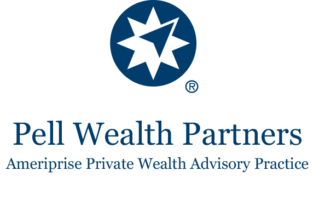Earth Matters focuses on conservation, sustainability, recycling and healthy living.
If Earth Matters to you, sign up for our mailing list and get the next installment delivered bright to your inbox.
by Ivan Rudolph-Shabinsky, Rockland Rowing Association, Inc.
As some may have surmised from a recent social media campaign, there is a certain segment of our village objecting to the decision to move the “EcoDock” from the Nyack Marina (even though it has languished in the parking lot for several years). We at the Rockland Rowing Association, Inc. (RRA) thought we might introduce you to the people (not the Facebook hashtags) behind why moving the Ecodock makes sense for the Village, and area residents.
Let’s begin with the the fact that the RRA never owned the EcoDock, and has never claimed to. Rather, more than ten (10) years ago, we found a grant to pay for it. We raised $34,000 to help get the 3-1 match that was needed to buy it with the remaining $16,000 coming from work by the Nyack DPW, and other things that were deemed dock-related work. We put in countless hours designing it so that it would meet the needs of rowers and figuring out how it could work. After it was installed, we spent countless hours maintaining it every day from March to November while it was in the water. But we never owned it. It was there for everyone to use.
Why would a group of people spend this much time and effort on something they didn’t own? Why would a Village of Nyack agree to work with such a group of people? Who are these people served by the RRA?
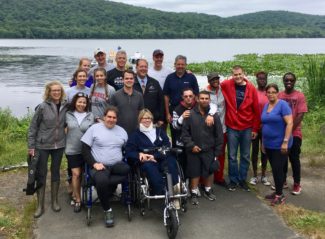 Let me introduce you to Sheila. Sheila had come to Rockland Lake several years ago because someone convinced her to try a new adaptive sport – rowing. She was terrified. Sheila has a condition which makes it hard for her to walk requiring a walker or wheelchair. She lives with a lot of pain. Sheila was pretty sure she could not swim, and the rowing shells were so skinny! But she is also brave, and she allowed herself to be lowered into a two-person rowing shell by some volunteers. With some assistance, she began to learn to row. And she loved it! Moving across the still water in a boat that she was helping to power brought her, and continues to bring her, great joy. And Rockland Rowing told her they’d get her out two or three days a week due to a committed group of volunteers and Coach Greta. During the pandemic, before people were vaccinated, Rockland Rowing had to stop their adaptive program as it wasn’t safe to have volunteers work in close proximity to move rowers like Sheila into and out of the boats or to get in the boats with them. So, over the past year, Sheila would drive to the lake and just look out over the water and dream about rowing on it.
Let me introduce you to Sheila. Sheila had come to Rockland Lake several years ago because someone convinced her to try a new adaptive sport – rowing. She was terrified. Sheila has a condition which makes it hard for her to walk requiring a walker or wheelchair. She lives with a lot of pain. Sheila was pretty sure she could not swim, and the rowing shells were so skinny! But she is also brave, and she allowed herself to be lowered into a two-person rowing shell by some volunteers. With some assistance, she began to learn to row. And she loved it! Moving across the still water in a boat that she was helping to power brought her, and continues to bring her, great joy. And Rockland Rowing told her they’d get her out two or three days a week due to a committed group of volunteers and Coach Greta. During the pandemic, before people were vaccinated, Rockland Rowing had to stop their adaptive program as it wasn’t safe to have volunteers work in close proximity to move rowers like Sheila into and out of the boats or to get in the boats with them. So, over the past year, Sheila would drive to the lake and just look out over the water and dream about rowing on it.
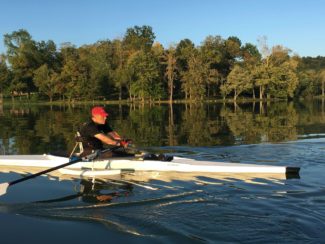 Ron was a NYC investment banker. Until that car drove across the median and hit him and the bike he was on- head on. Today, Ron rows two or three times a week on Rockland Lake in a specially adapted single that the Reeves Foundation and USRowing helped fund. At least two volunteers are needed every time Ron goes in the water. We found out how important those volunteers are when Ron’s single flipped once at a race in Hartford. One volunteer on the safety launch was in the water almost as fast as Ron was and held Ron’s head above water until the launch was able to get next to him and he was pulled from the water. Ron was shook. But he didn’t stop rowing – because he loves it. Rowing gave him back his athletic life. With incredible willpower, Ron – who is paralyzed from the chest down – trained this new athletic self to the point where he recently walked his daughter down the aisle at her wedding using a new exoskeletal contraption that researchers have developed.
Ron was a NYC investment banker. Until that car drove across the median and hit him and the bike he was on- head on. Today, Ron rows two or three times a week on Rockland Lake in a specially adapted single that the Reeves Foundation and USRowing helped fund. At least two volunteers are needed every time Ron goes in the water. We found out how important those volunteers are when Ron’s single flipped once at a race in Hartford. One volunteer on the safety launch was in the water almost as fast as Ron was and held Ron’s head above water until the launch was able to get next to him and he was pulled from the water. Ron was shook. But he didn’t stop rowing – because he loves it. Rowing gave him back his athletic life. With incredible willpower, Ron – who is paralyzed from the chest down – trained this new athletic self to the point where he recently walked his daughter down the aisle at her wedding using a new exoskeletal contraption that researchers have developed.
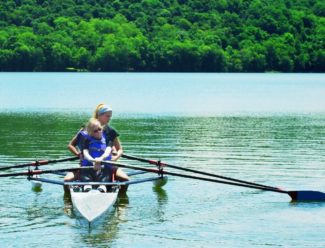
Jane was a lifelong Nyack resident who started to row because her sons were enjoying the program. She joined the adult rowers and soon became the most consistent early morning rower in the program. She also was the person who would come down, dragging her husband Jim, to the Nyack marina every time a storm hit. She knew that the safety launch would fill with water and sink if someone didn’t bail it. Jim didn’t row, but he felt the family passion, and when we decided to build our first dock, Jim used his carpentry skills to help us. We built a beautiful low profile wooden dock that was about 40 feet long. We’d moor it out on the river and then pull it in alongside the municipal dock when rowing practice was in session. After practice, we’d detach the dock and pull it back out to its mooring on the river. We did this every day for years. Jane, unfortunately, developed a brain tumor. It wasn’t cancerous, but it was affecting her balance and the operation was supposed to be reasonably simple (as far as brain surgery goes). It didn’t work out that way. She survived, but the massive bleeding in her brain after the operation left her unable to talk or feed herself. Jim took care of her until she died. In those difficult years, one of the few times she would smile was when we would take her out rowing. To make that happen, we and volunteers from Helen Hayes would pick her up out of her wheelchair and place her in the bow-seat of a two-man shell with another rower sitting in the stroke seat. She couldn’t hold the oars herself, so one of our youth rowers (a third person in the boat) would climb in with her and hold Jane up by hugging her from the back while guiding Jane’s hands to the oars and helping her row. Jane in stroke see, a youth rower behind providing the propulsion, but Jane would feel the sensation of the boat gliding along the water, and she’d smile.
Those are some of the tear-jerkers, but there are also lots of happy stories. This year our four graduating seniors in our youth program are all, after a challenging year of pandemic and school closings, heading off to college to row. Two will row at Fordham, one at UCONN and one at Cornell. Over the 20 years we’ve run our youth program, almost every one of our graduating seniors has gone on to row in college. One of our assistant coaches today, Erica, rowed for us for four years while also competing on the school team at Clarkstown. She then rowed for four years at the University of Buffalo. After graduating, she earned a nursing degree here in Rockland at Dominican College and is now helping us start the new collegiate program, possibly the only collegiate program at a minority-serving institution in the United States. But, even those who didn’t go on to row in college had rowing successes. Peter went on to serve in the military, but while he was a senior at TZ High School he and his doubles partner placed third in the country as USRowing’s Scholastic Nationals.
Father Mark runs a middle school in Newburgh, NY. His students are mostly Mexican boys whose parents send them to Fr. Mark to keep the children off the streets of some challenging neighborhoods. While Fr. Mark never rowed, he decided that these kids would have a better shot at getting into prep schools if they rowed. After 10 years of existence, San Miguel Academy’s fledgling crew raced their first-ever race in Philadelphia at the Independence Day Regatta a few weeks ago. Ten young rowers from Newburgh competed, and the top group qualified for the finals in the U17 fours race (the finals were cancelled due to thunderstorms). They got to Philadelphia as part of Rockland Rowing. We invited them to practice with us at Rockland Lake, signed them up for their first race and trailered their equipment to Philadelphia. While we were there, Arshay Cooper came to speak to the boys from San Miguel – if you want to see what rowing means to Arshay – watch the award-winning film, “A Most Beautiful Thing.” Fr. Mark’s comment was that Rockland Rowing has done more for San Miguel in a few months than anyone had done in 10 years.
 These are the tip of the iceberg. We have been operating locally for over 20 years. We have over 100 people rowing today across our programs and probably introduce an average of at least 50 people a year to the sport. Over 20 years that is over 1000 stories like the ones above. Every one of them is important to the people involved. Perhaps the very tip of that iceberg is Charlotte Buck. A Nyack resident who learned to row with Rockland Rowing between when she graduated from Nyack HS and when she went to Columbia University. On graduating she came back to coach our youth program. She is currently in Tokyo with Team USA as part of the women’s rowing team. If all goes well, she and her teammates will be defending three consecutive gold medal wins in the women’s eights on July 30 (evening of July 29 in NY). We are proud of all our rowers. Seeing one of them reach the pinnacle of our sport is icing on the cake.
These are the tip of the iceberg. We have been operating locally for over 20 years. We have over 100 people rowing today across our programs and probably introduce an average of at least 50 people a year to the sport. Over 20 years that is over 1000 stories like the ones above. Every one of them is important to the people involved. Perhaps the very tip of that iceberg is Charlotte Buck. A Nyack resident who learned to row with Rockland Rowing between when she graduated from Nyack HS and when she went to Columbia University. On graduating she came back to coach our youth program. She is currently in Tokyo with Team USA as part of the women’s rowing team. If all goes well, she and her teammates will be defending three consecutive gold medal wins in the women’s eights on July 30 (evening of July 29 in NY). We are proud of all our rowers. Seeing one of them reach the pinnacle of our sport is icing on the cake.
Why are these stories important? Because they explain why a large group of individuals volunteer their time, effort and money to make this program work. The RRA’s mission is to “improve people’s lives through the sport of rowing.” Because we believe we are actually doing that, we are highly motivated. Does the program make any money? No. It loses money every year. If not for the generous donors who support the programs and if not for the volunteers who serve on the board, help run the adaptive team, fill out grant applications (like the EcoDock!), etc. – the RRA would not exist.
Do some people get paid? Yes. The coaches are hired to provide safety to the rowers and to teach them how to row well. For example, our head coach makes less than $40,000 per year, but commutes two-hours – in each direction – to make practices. That is four hours of commuting and a demanding job of coaching 50 youth rowers, for peanuts. Why? Because our coaches are passionate as well. Our various assistant coaches are paid $20 per hour. They are all professionals – with tremendous rowing experience and training in CPR/AED.
Our all-volunteer board has professionals in the medical, legal, marketing, construction, technology and financial fields. As a 501(c)3 Public Charity, our finances are open to the public. No one is in this for the money. Do people in the programs pay? Yes. We are probably the cheapest rowing club in the region. A youth rower’s family typically pays $400 per season. This doesn’t come close to meeting the costs. Compare it to most other sports in our area and you’ll find this is relatively affordable. But we also make sure that even this subsidized cost never hinders anyone from rowing. Anyone is able to tell us that they can’t afford the payments and we simply ask them to pay what they can afford. We don’t ask for proof – we rely on an honor system. We’ve had plenty of families who stopped paying briefly due to a lost job or other emergency and then started paying again when they could. Usually, these families have also made it a point to help out at regattas and contribute in any way they can. We are one big family and we help each other out.
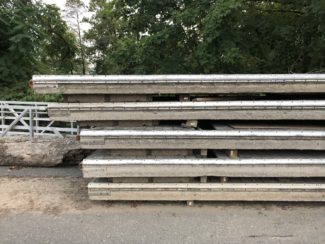 So – finally – back to the dock in Nyack. The EcoDock in Nyack was never ours. We worked hard to get it to Nyack. It was designed for us to use. But it was never ours. Once NY State asked us to stop rowing under the new bridge, they graciously permitted us to start using Rockland Lake, and we left the EcoDock. Unfortunately, after we departed Nyack, the EcoDock’s use declined dramatically. The village began to see it as more of nuisance than a benefit. It required significant maintenance, it used scarce parking resources, and it wasn’t being used much, if at all. We are currently in the middle of developing a larger rowing venue at Rockland Lake where the park has permitted us access to the unused old pool complex at the south end. Our arrangement there allows the park to remove us at any time, but we believe they understand the benefits we bring and see the commitment we have to providing a valuable service to the community. They understand our stories.
So – finally – back to the dock in Nyack. The EcoDock in Nyack was never ours. We worked hard to get it to Nyack. It was designed for us to use. But it was never ours. Once NY State asked us to stop rowing under the new bridge, they graciously permitted us to start using Rockland Lake, and we left the EcoDock. Unfortunately, after we departed Nyack, the EcoDock’s use declined dramatically. The village began to see it as more of nuisance than a benefit. It required significant maintenance, it used scarce parking resources, and it wasn’t being used much, if at all. We are currently in the middle of developing a larger rowing venue at Rockland Lake where the park has permitted us access to the unused old pool complex at the south end. Our arrangement there allows the park to remove us at any time, but we believe they understand the benefits we bring and see the commitment we have to providing a valuable service to the community. They understand our stories.
As part of our agreement with New York State, we have permission to install a large, handicapped accessible dock for our use – but which would also be available to kayakers and others. We do not own the dock. We are paying to have it installed and we are maintaining it, but we do not own it. It is the property of NY State. We could have simply purchased a new dock (and still could – we’d have to fundraise to do this), but that seemed to us illogical when a perfectly suitable dock was sitting unused in Nyack. Nyack has transferred their dock to NY State (New York State gave the grant to pay for it originally), and our understanding is that this was done properly. We are not a party to the transaction. That said, our rowers – some of whose stories you’ve read above – are very much the beneficiaries.
Our mission is to improve people’s lives through the sport of rowing, and we hope that we can re-purpose the EcoDock to serve the residents of New York State. We think you will agree, and we welcome all to join our Rockland Rowing community.
Ivan Rudolph-Shabinsky is Director and President of the Rockland Rowing Association.
Read Earth Matters every Wednesday on Nyack News And Views, or sign up for the Earth Matters mailing list.
Earth Matters is a weekly feature that focuses on conservation, sustainability, recycling, and healthy living. This weekly series is brought to you by Julie Wendholt, Financial Advisor & Vice President of Pell Wealth Partners, a private wealth advisory practice of Ameriprise Financial Services, LLC.
